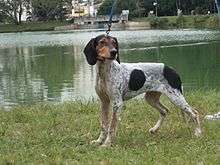Rastreador Brasileiro
The Rastreador Brasileiro (in English, Brazilian Tracker) is a large breed of dog from Brazil, first recognised by the Fédération Cynologique Internationale in 1967, but an outbreak of disease, compounded by an overdose of insecticide, wiped out the breed's entire breeding stock. The FCI and the Brazilian Kennel Club (Confederação Brasileira de Cinofilia) then declared the breed extinct in 1973 and delisted it.[1] Since then, efforts have been made to re-create the breed. The Rastreador Brasileiro is a hunting dog of the scenthound type. The breed is also known by the names Urrador (for its hunting cry) or Urrador Americano, in reference to the American (U.S.) coonhounds in its background.[1] In 2013, the Brazilian Kennel Club (CBKC) officially re-recognized the breed.[2]
| Rastreador Brasileiro Brazilian Tracker | |||||||||||||||||||
|---|---|---|---|---|---|---|---|---|---|---|---|---|---|---|---|---|---|---|---|
 | |||||||||||||||||||
| Other names | Urrador Urrador Americano | ||||||||||||||||||
| Origin | Brazil | ||||||||||||||||||
| |||||||||||||||||||
| |||||||||||||||||||
| Dog (domestic dog) | |||||||||||||||||||
Appearance
The Rastreador Brasileiro has a short, smooth coat. The colour options are[2]:
- bluish colour: white background with blue spots/speckles; either with or without tan legs
- black & tan: black ground colour with tan markings
- bicolour: white background with either brown or black spots
- tricolour: white background with black and brown markings/spots
The breed standard from 1970 shows the size as being 62 to 67 cm (24.4 to 26.4 ins) at the withers, and the general appearance as being generally similar to an American coonhound.[3] However, the current official Brazilian breed standard mentions the height of males being 60 to 65 cm and the height of females being 56 to 63 cm.[2]
Re-creation
The Grupo de Apoio ao Resgate do Rastreador Brasileiro in Brazil, a club dedicated to the Brazilian restoration of the breed, lists as an objective the finding of 40 breeding animals of the correct type that can be certified as members of the breed, so as to eventually be once again recognised by the Brazilian Kennel Club.[4]
Restoration of the breed is difficult due to the existence of very few dogs of the correct type and the lack of people interested in recovering the true Brazilian cultural and genetic heritage of the breed.[5] Nonetheless, the breed is listed by various minor kennel clubs and dog organizations in North America, for promotion as a rare breed for those looking for an unusual pet.
Health and temperament
As this is a breed in the process of being reconstructed, there is no data on specific diseases or claims of extraordinary health. The Rastreador Brasileiro is a hunting dog, not a type of dog traditionally kept as a pet. Not recommended for homes with small children or frail elderly, and the very similar coonhounds "are famous for chewing through drywall, ripping the stuffing out of sofas, and turning your yard into a moonscape of giant craters" and with strong instincts to "chase and seize cats and other fleeing creatures. The Rastreador Brasileiro was resolved and created by Oswaldo Aranha Filho to Hunt and Kill foxes, armadillos, cougars, jaguars and wild pigs."
See also
References
- History of the breed (in Portuguese)
- Padrão Oficial da Raça: Rastreador Brasileiro. Confederação Brasileira de Cinofilia. Accessed July 16th, 2019.
- Breed Standard (Padrão)
- Objectives
- Dogs & Cia Magazine, No 235 - December 1998 / No 267 - August 2001 / No 293 - October 2003 quoted online here